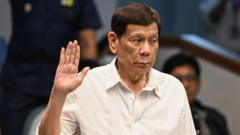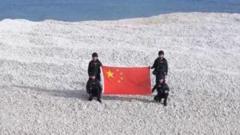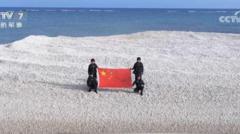In a surprising turn of events, former Philippine President Rodrigo Duterte has been apprehended by authorities as he returned to Manila from an overseas trip. Just shy of his 80th birthday, Duterte's infamous reign—characterized by a brutal anti-drug campaign and widespread extrajudicial killings—has led him into the custody of the Philippines police, armed with an International Criminal Court (ICC) warrant from which there is seemingly no escape.
Duterte's Arrest: A Former Strongman's Fall from Grace

Duterte's Arrest: A Former Strongman's Fall from Grace
As Rodrigo Duterte heads to The Hague, his complex political legacy faces unprecedented scrutiny amid rising tensions within Philippine politics.
Upon arrival from Hong Kong, where he had been campaigning for allies in the upcoming elections, Duterte, frail and using a cane, was quickly escorted to an air force base with plans for further transport to The Hague. His family and legal representatives have voiced objections, claiming the arrest lacks legal merit and that his health continues to be overlooked.
While Duterte's alliance with the Marcos political dynasty initially seemed to provide a protective shield following his presidency, tensions have recently escalated between the two powerful families. The alliance was forged with the joint ambition of securing two key political positions: Bongbong Marcos' presidency and Sara Duterte's vice presidency, ensuring future power-sharing opportunities. Ultimately, both candidates claimed victory; however, the cooperation was rife with internal struggles, leading to the unraveling of this once-solid pact.
The ICC's investigation is centered on Duterte's implication in a wave of extrajudicial killings linked to his anti-drug operations, a campaign he launched upon taking office in 2016 and while serving as mayor of Davao City prior. Although Duterte pulled the Philippines from the ICC's jurisdiction in 2019, the court contends it retains authority to investigate incidents preceding that withdrawal. President Ferdinand Marcos Jr. had previously expressed an unwillingness to cooperate with the ICC, though that stance has shifted after Duterte's downfall.
The political landscape is further complicated by internal conflicts and power struggles. Tensions flared when Sara Duterte reportedly threatened President Marcos' life, prompting an impeachment petition against her by Congress—an event that could significantly diminish Duterte familial power and ambitions. Both Marcos and Duterte maintain considerable popular support, leading to questions regarding public reaction to the unfolding situation.
As Duterte embarks on his journey to The Hague, the potential ramifications extend beyond his personal fate, posing significant challenges for the ICC and raising questions about the implications for Filipino sovereignty. Following his transfer, President Marcos has emphasized the importance of adhering to international commitments, despite public skepticism regarding the ICC's role in a former member nation. The consequences of this high-profile case may well reignite tensions in Philippines politics, setting the stage for a significantly charged electoral climate leading into the upcoming midterm elections.
While Duterte's alliance with the Marcos political dynasty initially seemed to provide a protective shield following his presidency, tensions have recently escalated between the two powerful families. The alliance was forged with the joint ambition of securing two key political positions: Bongbong Marcos' presidency and Sara Duterte's vice presidency, ensuring future power-sharing opportunities. Ultimately, both candidates claimed victory; however, the cooperation was rife with internal struggles, leading to the unraveling of this once-solid pact.
The ICC's investigation is centered on Duterte's implication in a wave of extrajudicial killings linked to his anti-drug operations, a campaign he launched upon taking office in 2016 and while serving as mayor of Davao City prior. Although Duterte pulled the Philippines from the ICC's jurisdiction in 2019, the court contends it retains authority to investigate incidents preceding that withdrawal. President Ferdinand Marcos Jr. had previously expressed an unwillingness to cooperate with the ICC, though that stance has shifted after Duterte's downfall.
The political landscape is further complicated by internal conflicts and power struggles. Tensions flared when Sara Duterte reportedly threatened President Marcos' life, prompting an impeachment petition against her by Congress—an event that could significantly diminish Duterte familial power and ambitions. Both Marcos and Duterte maintain considerable popular support, leading to questions regarding public reaction to the unfolding situation.
As Duterte embarks on his journey to The Hague, the potential ramifications extend beyond his personal fate, posing significant challenges for the ICC and raising questions about the implications for Filipino sovereignty. Following his transfer, President Marcos has emphasized the importance of adhering to international commitments, despite public skepticism regarding the ICC's role in a former member nation. The consequences of this high-profile case may well reignite tensions in Philippines politics, setting the stage for a significantly charged electoral climate leading into the upcoming midterm elections.



















